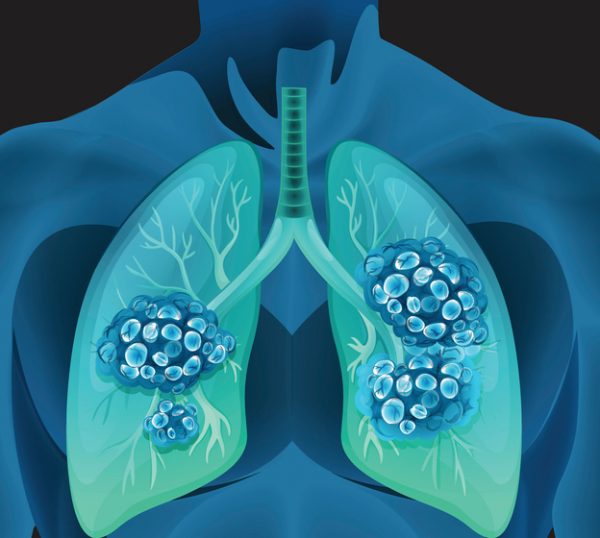
Motivations for startups can come from many different places. For Andrea Stephany, co-founder and CEO of OncoSwab, it came from family. Several years ago, her mother began experiencing a cough and other symptoms that she feared were signs of lung cancer. To find out for sure, she tried to get a CT scan, which is currently one of the standard ways of detecting this type of cancer. From first complaining of symptoms to getting the CT scan scheduled took Stephany’s mother 15 months.
“It was 15 months of constant worrying and thinking,” Stephany said. “It was challenging to experience that firsthand, how slow the system can be, how many barriers there are for a potentially bad diagnosis.”
The scan turned out negative and Stephany’s mother is healthy. If OncoSwab succeeds with its research, people like Stephany’s mother will have access to a simpler lung cancer detection test that won’t require the time and hassle of scheduling medical imaging. The only thing the test requires of a patient is a nasal swab that can be done from the convenience of home.
While the motivation for OncoSwab came from Stephany’s mother, the roots of the startup’s technology stem from a 2022 hackathon in the Dutch city of Leiden. More than 100 young scientists attended the multi-day event, which divided participants into small teams and challenged them to find new solutions to global problems. Stephany’s team was among those working on solutions for cancer.
The Covid-19 pandemic was still fresh in the minds of many hackathon participants, including Stephany. She recalled the efforts to develop new and better ways of detecting the novel coronavirus and was inspired to develop a similar test for cancer, one that analyze a nasal swab and to detect signs of the disease. Stephany’s team won third place in the cancer category.
Imaging tests are how lung cancers are commonly detected. Beyond a chest x-ray, methods include CT, MRI, and PET scans. In addition to being expensive and requiring a patient to go to a healthcare facility, Stephany said these tests often come too late. Earlier detection enables earlier intervention, when cancer treatment offers a better chance of success. Most lung cancers are diagnosed when the disease has already reached a more advanced stage, which is why death rates for this type of cancer are so high, Stephany said.
Tumors shed compounds that can be picked up in screening tests. Liquid biopsies are based on the ability to pick up biological indicators of a cancer that circulate in the blood. The idea of using a nasal swab to detect lung cancer is based on the nature of this type of cancer. OncoSwab’s approach is based on evidence that signs of lung cancer are found in the air we exhale. Stephany said pulmonologists she has spoken with expressed support for OncoSwab’s approach.
“The tumor is in constant contact with the airway — that’s why some doctors say that it makes total sense,” she said.
The OncoSwab test is designed for sample collection either at a patient’s home or at the point of care. Analysis of the nasal swab looks for biomarkers of lung cancer. Stephany said these biomarkers are known in the cancer research community, but for confidentiality reasons, she cannot disclose specific biomarkers that OncoSwab is detecting. She did acknowledge that the startup’s test looks for a combination of biomarkers, which are analyzed with a proprietary algorithm. Analysis of the samples will happen in an OncoSwab lab. The company has an R&D lab in Europe. Stephany plans to establish a U.S. lab when the company approaches commercialization, which she acknowledges is still far away. The technology will yield a test result in 24 to 48 hours.
OncoSwab, which splits its operations between San Francisco and Corroux, Switzerland, incorporated in 2023. Stephany said her discussions with pulmonologists revealed another urgent need beyond screening. When a patient goes to the emergency room and receives a CT scan for any reason, sometimes that scan reveals a nodule in the lung that could indicate lung cancer. For a more definitive answer, the next step is a biopsy. OncoSwab’s test could offer a less invasive way to determine whether a nodule is cancer.
“That lung nodule can be nothing, probably, but it can also be cancer,” Stephany said. “The system is too overwhelmed to follow up. 60%, if not more, are lost completely in the system. In 60%, some can be lung cancer.”
OncoSwab is not the only company developing a test that detects cancer from compounds swirling in people’s airways. Like OncoSwab, some of these companies have Covid-19 origins. The breath test that Breathe Biomedical is developing for cancer was conceived during the pandemic. This breath analysis technology was able to differentiate between those with Covid-19 pneumonia and those without Covid-19 pneumonia. Results were published in March 2024 in the Journal of Breath Research.
Breathe Biomedical’s cancer research started with lung cancer. But in 2023, the company pivoted to breast cancer detection. Longer term, Breathe Biomedical has said it aims to develop its technology into a medical device offering multi-disease detection, a goal shared by many in this growing field. Companies developing tests that analyze breath to detect signs of cancer and other diseases include Owlstone Medical, Pulmostics, Noze, and Blu Biotech.
Stephany acknowledged that there is opportunity to apply OncoSwab’s technology to other conditions, including additional cancers. But she said the company’s initial focus is lung cancer. OncoSwab is developing its technology as a laboratory developed test, which does not require FDA clearance. The company is supported by an undisclosed amount of pre-seed financing and is currently looking to raise additional capital to fund clinical research.
Illustration: Blueringmedia, Getty Images










